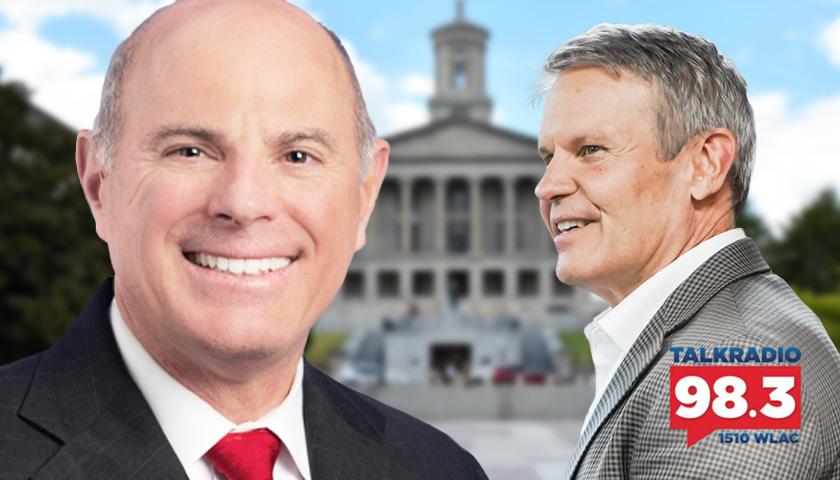Live from Music Row Friday morning on The Tennessee Star Report with Michael Patrick Leahy – broadcast on Nashville’s Talk Radio 98.3 and 1510 WLAC weekdays from 5:00 a.m. to 8:00 a.m. – host Leahy welcomed the original all-star panelist Crom Carmichael and attorney Gino Bulso in studio to discuss the important piece of legislation signed into the law by Governor Bill Lee yesterday regarding the 10th Amendment
Leahy: In studio the original all-star panelist, Crom Carmichael. Good morning, Crom.
Carmichael: Good morning, Michael.
Leahy: Also in studio, one of the finest men I know. The state representative from the northern part of Williamson County in the Tennessee House of Representatives and one of the best attorneys in the country. Mr. Gino Bulso. Good morning, Gino.
Bulso: Good morning. Good morning, Michael.
Leahy: We’ve both been up a little bit late, haven’t we?
Bulso: Indeed, we have.
Leahy: In fact, it was a late-night text exchange that brought you here, and we’re delighted that you’re here. You were at the center of everything yesterday. And just to summarize for our listeners, the Tennessee House of Representatives expelled two Democratic members, Justin Jones, Justin Pearson, and barely missed expelling the third, Gloria Johnson.
You are right in the center of that. We’ll talk about that in our next segment with you. But what I would like to talk to you about right now is how you had an important piece of legislation signed into the law by the governor yesterday on the 10th Amendment.
Bulso: Yes, Michael. We sure did. It originated as House Bill 38 and was sponsored in the Senate by Senator John Stevens. And effectively, it is a vehicle to bring an action against the federal government under the 10th Amendment to push back on both federal overreach and add control of federal spending. This has been a passion of mine for quite some time.
Leahy: When you were running, you and I talked about this, and I’m a big fan of the 10th Amendment. I’m a big fan of classic federalism as defined in the Constitution, where the states have powers and rights and the national governance powers and rights, and the national government doesn’t encroach upon the state. That’s the way it’s supposed to work.
Bulso: That’s the way that the Founders set it up. In fact, when you look at Federalist 45, I’m sure you recall that James Madison noted that the powers of the federal government are “few and defined.” Those of the state governments are “numerous and indefinite,” which is the reverse of what our government looks like.
Leahy: When did the national federal government forget that and reverse it?
Bulso: I think you can probably trace it back to 1936 in the Supreme Court decision of U.S. versus Butler, which went away from James Madison’s view of Article One, Section Eight, Clause One of the Constitution, which is known as the Taxing and Spending Clause or the General Welfare Clause because as you know from your constitutional training, the federal government only has the power to spend money on three things: the national debt, the defense, and what’s called “the general welfare.”
Leahy: The general welfare, the catchall that Democrats use for all sorts of giveaway programs. Crom, I see you smiling at that one.
Carmichael: That started in the 40s. Dwight Eisenhower, in order to put in an interstate highway system, believed he had to put it under a military budget. There was no such thing as an infrastructure bill back then.
Leahy: Very good point. What will the state of Tennessee do now that this bill has been signed into law?
Bulso: The law provides, and the law is Section 8-6-106 of our Tennessee code. It allows the Speaker of the House and the Speaker of the Senate jointly to retain additional counsel that is counsel, in addition to the attorney general to bring an action in federal court on behalf of the state and to vindicate the state’s constitutional rights.
Now that the law has been signed by Governor Lee, and it goes into effect on July 1, I plan to present to both Speaker Sexton and Lieutenant Governor McNally, a complaint to be filed in the original jurisdiction of the U.S. Supreme Court, Article Three, Section Two of the Constitution claiming that in fact, the Supreme Court needs to return to the way that James Madison wrote and interpreted the general welfare clause, Article One, Section Eight, Clause One of the Constitution and freeze federal spending and to begin limiting the federal government to the powers that are specifically delegated and enumerated in the Constitution.
Leahy: Then that complaint then will be acted upon or can be acted upon by either the attorney general or somebody selected by the Tennessee General Assembly, correct?
Bulso: The complaint could be acted upon by the Supreme Court once we prepare it, obviously, the U.S. Supreme Court has discretion as to what cases it takes and it doesn’t take, but we’ve got those five wonderful constitutional conservatives there, and we’ve got John Roberts as a six vote on many occasions.
We’re hopeful that perhaps the attorney general’s office will sign onto it. As you know, General Skrmetti is tremendous. And his view and my view of the federal Constitution are identical on all of these issues.
And likely, once we have the complaint prepared, we will go ahead and present it to the U.S. Supreme Court and let’s hope that they agree that this is time to go ahead and take on the federal government.
Leahy: Crom, do you want to close this segment out?
Carmichael: I want to ask Gino a question as it relates to the law in Wisconsin. They elected as a Supreme Court justice up there, and we’ve now learned that one of the techniques that they used was they paid $250 to connect people in such a way so that they could make sure that they would vote and get paid.
And you mentioned it to me, and I don’t know the details, I just saw the piece on Tucker Carlson. You said I believe that that’s illegal. And Tucker Carlson actually cited the law that makes it illegal.
But my question is, if it is illegal and somebody tries to bring an action since it was a State Supreme Court Justice, will it be decided ultimately by the state Supreme Court in Wisconsin because it was a state race, not a federal race? And the Democrats, I think this is the way they will conduct themselves in all future elections by literally buying votes.
Bulso: I think yes. That is gonna be a state law issue that is going to be litigated in the state courts of Wisconsin. Ultimately, it’ll be the Supreme Court of Wisconsin that’ll have to decide that question.
Carmichael: Which is now four to three liberal.
Leahy: But that seventh judge may have to recuse herself on this.
Listen to today’s show highlights, including this commentary:
– – –
Tune in weekdays from 5:00 – 8:00 a.m. to The Tennessee Star Report with Michael Patrick Leahy on Talk Radio 98.3 FM WLAC 1510. Listen online at iHeart Radio.
Photo “Gino Bulso” by Tennessee General Assembly. Photo “Bill Lee” by Gov. Bill Lee. Background Photo “Tennessee State Capitol” by FaceMePLS. CC BY 2.0.





